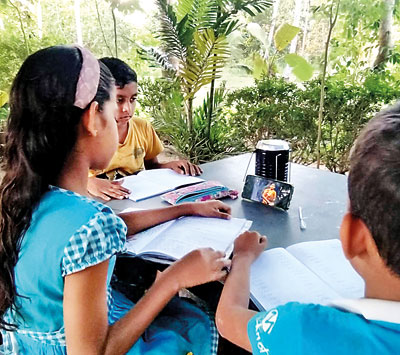News
Fatigue sets in with online lessons disrupted by lack of access
View(s):By Renishka Fernando
“Miss, I’m sorry I’m on top of my well trying to get a stable internet connection,” was the response teacher Sujeewa Fernando got from a student who has continued to struggle to re-enter her online class because the internet connection was unstable.
The student had been referring to a household well used as a water source.
Ms Fernando, who has 26 years of experience and who is from Moratuwa, teaches political science and Sinhala to Advanced Level and Ordinary Level students.

Education in multiple crises
She said the lack of online internet access is worsening the educational divide in Sri Lanka.
Meanwhile, the lockdown has also led to the creation of a generation that is lethargic.
Students are addicted to digital devices as they spend a considerable amount of time using them. Teachers also have doubts as to whether the subject matter is being absorbed by students.
“Their cameras are switched off and they don’t ask questions, we don’t know if they are paying attention,” commented Ms Fernando.
O Level student, 14-year-old Revon Fernando, said: “I’m scared for my future. There is so much uncertainty and education is the only way out for most of us.’’
Darshani Rananja, a 56-year-old with 34 years of experience in teaching, said online education had broken the rapport between student and teacher and badly affected students’ personality growth.
She has noticed demoralised children in grade 7 and 8 classes. Habits like sharing and caring have faded. In addition, loneliness and the lack of social interactions have increased.
Difficulties in covering the syllabi and the postponement of exams have proved detrimental for teachers and students.
Roshini Fernando, a grade 2 teacher with 30 years of experience, told the Sunday Times that children had been exposed to information technology, while parents were aware of the curriculum and could supervise their children.
Ms Fernando, who teaches at an international school, said students were now used to online education.
Vinita Shenoy, the principal of Gateway College Colombo, is an educator with 35 years of experience.
She notes that while the coronavirus pandemic spread fear of infection and calamity, the economic collapse has led to creative ways of thinking. “It is a whole level of anxiety affecting all age groups.”
While going digital has been challenging for many, Gateway College has had a relatively easier process as they had been using the online learning system from 2018 onwards.
“Be it Bhakthi Gee, Carols or the inter-house sports meet, we had it all online,” Ms Shenoy noted.
Rajiv Ekanayake, the chief executive officer of Lyceum International Schools, noted that students had been psychologically affected due to the isolation.
Students had also started using devices beyond learning hours, which has a negative impact. But for the most part, children have progressed and accepted the situation. They, too, had not faced difficulties in finishing syllabi and holding examinations.
“In education, equity has to be maintained at all costs especially since we boast of free education etc. The pandemic and the subsequent situations of social, economic and political crisis have worsened existing inequalities and brought forth new ones,” said a 46-year-old university lecturer with 21 years of experience. She preferred to remain anonymous.
She told the Sunday Times that 80% of students did not have access to devices and internet connections.
While learning had shifted online in 2021, there are many new challenges in 2022 as students are caught between high costs of food and transport. In addition, although many universities are said to be residential, adequate facilities are unavailable due to the increasing student numbers over the years.
While many students had graduated on online participation alone, practical and field components had not been adequately addressed.
“Our university is constantly struggling between online and physical lectures. A practical subject like IT requires on-site education,” highlighted Sheruni Boteju, a second year cyber security student at a private university.
“The government wants to create an uneducated future generation so they can keep getting elected,” said Ms Subhashini Fernando, a mother of two aged 15 years and 17 years.
She believes the present crisis is the worst. Children are distracted during online classes and the lesson duration is much shorter.
“I have a daughter in university who is now at home. She has only had lectures for one subject. If things continue, she will finish her degree much later and her job prospects will be less,” said Srilani Fernando, mother of three aged 14 years, 16 years, and 21 years.
While students from private universities can finish their degrees at a younger age, this is not the case for undergraduates from state universities.
The best way to say that you found the home of your dreams is by finding it on Hitad.lk. We have listings for apartments for sale or rent in Sri Lanka, no matter what locale you're looking for! Whether you live in Colombo, Galle, Kandy, Matara, Jaffna and more - we've got them all!

